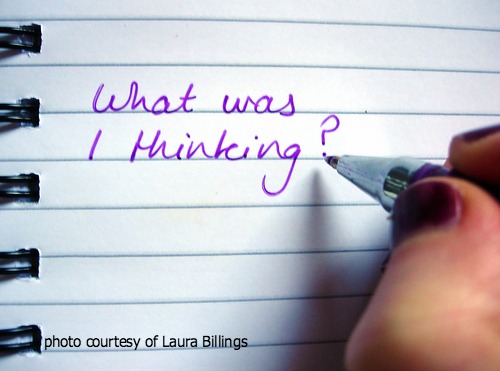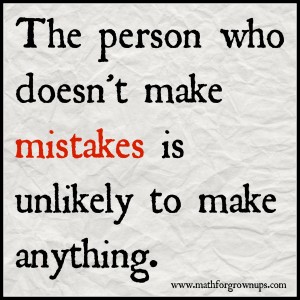Today, I’ve asked Siobhan Green to share her math story with everyone. As the CEO Sonjara, Inc., a woman-owned technology firm, she is a huge proponent of increasing women and men’s math skills worldwide. But she hasn’t always felt confident in her math skills. As she told me, “I think my story is not that unusual in how many of us, especially girls, too easily believe that math is hard and only for super smart math geek types.” Amen!
I was considered a smart kid. I learned to read early, knew my numbers and letters before age 3, entered first grade early and did well in school. However, when I got to third grade, I and my teachers started noticing a discrepancy between my math scores and the rest of my school work. I would regularly get poor grades on timed math tests — two- and three-digit addition and subtraction problems — which predominated our math education. I easily mastered the concepts presented, but when given a timed test, I would run out of time and/or make a lot of odd mistakes.
This pattern continued in elementary school. The result was that I was either yelled at by teachers for being lazy or intentionally not focusing on my math work, or the teachers just assumed I was “bad at math.” I vividly remember one teacher saying “Yeah, girls are better at verbal skills, boys at mathematical/spacial ones. Just stick to what you are good at.”
Things got better in seventh grade when we moved to pre-algebra. I was excellent at pre-algebra and routinely got As and Bs on tests. But I also managed to make the teacher mad when a group of students was interviewed by a local paper and I made a disparaging comment about him (I had no idea what I was doing). As a result, he recommended that I NOT move into Algebra as my grades would warrant but rather into pre-algebra/algebra, for kids who struggled. No one — not my guidance counselor, nor my parents, nor even me — remarked on this fact, as we all had agreed by that point that I was “bad at math.”
This decision had huge implications. Math is tracked; students take algebra, then geometry, then algebra II and then trig, and only then can you take calculus. By not allowing me to go into algebra in eighth grade, I would not take calculus in high school — something that excluded me for many science (especially computer science) learning opportunities.
The rest of my educational history with math was similar – I excelled in algebra (go figure), did fine in algebra II and trig and did surprisingly well in geometry, but my heart wasn’t in it. I also took some basic computer programing courses — BASIC and Pascal. I enjoyed these but never associated them with math, and the overwhelmingly geeky-boy atmosphere of the computer lab turned me off to more experimentation in these fields. By the time computer science camps started becoming popular in high school (in the mid/late 80s), many programs expected that students would be in advanced math classes.
My college degree was in international affairs, which required two years of economics. I was NOT good at economics, and because I didn’t know calculus, and my antipathy for anything involving numbers, was a big part of it. I excelled in the social sciences and went onto a career in international development.
However, over the years of my career, I noticed that I was good at technology — I was the person in the office who figured out the printers, who set up macros and templates in Word, and who taught herself basic HTML. I was also a whiz with developing databases and excel spreadsheets and was often the person who tracked expenses and invoices. I became more and more interested in using technology for international development; I did my masters’ dissertation on the Internet in Africa in 1997. Falling in love with a software developer didn’t hurt, either.
It was actually through my husband (the math/computer science major and total math geek) that I realized I am NOT bad at math. I am in fact pretty darn good at it, and a lot of the tasks I enjoyed “count” as math!
Andy recognized that I have a mild learning disability — dyscalculia. I transpose numbers, have a hard time retaining numbers in my head, don’t memorize numbers well (I still don’t know my 7 and 8 times tables by heart — and by now, I will never memorize them), and often misstate numbers when going from listening to writing. (Trying to capture a number left on a voicemail is torture for me.) And this is true after years of learning coping skills! He was the one who said “Your calculation mistakes are not normal. And they have NOTHING to do with your math abilities.”
See, remember those timed tests? Thinking back, I would think one number and write down another one. Now, I always take a second to double check, but in a timed situation at age 8, I would panic and just move on to the next one. Many of the mistakes I made in the early years were down to calculation errors. When the math was based in patterns (like algebra) or depended on calculators, I did much better. But by that time, my math ability had become a self-fulfilling prophecy. The research is clear about the impact of low expectations on ability; I never pushed myself and accepted lower scores as evidence of my innate lack of talent.
I didn’t realize that my strong abilities in building relational databases, especially to track quantitative data, counts as math! I absolutely love building databases, especially related to financial management. Those spreadsheets I use to track finances? They speak to me and tell me a story in numbers. I had no idea that my ability to create and read those numerical pictures of my firm also counted as math.
Andy also taught me how to program, and while I will never be a full blown developer (mainly because I don’t have time to gain in-depth programming experience), he found that I grasped the key pattern processes quite easily. This skill has been invaluable in my role as business process analyst for web application development. It helps me translate between user needs and programming architecture, which helps with figuring out edge cases and pricing.
Today, my job as CEO of a web application company involves a lot of math. For example:
* Pricing work, especially figuring out hourly rates for specific roles/individuals based on salary, benefits, and overhead plus profit. It is very easy to “win” enough work for bankruptcy (win the work but price it so low you don’t cover your costs). We are always repeating the joke “yeah, we lose $1 per widget sold but we will make it up in volume.” (The explanation is at the bottom.)
* Overseeing projected and actual utilization of my staff. If our rates are based on this person being at 80% billable, and they are regularly at 75% billable, that 5% difference will eat into my profit.
* Understanding the difference between the profit and loss statement, the balance sheet, and a cashflow statement. This is omething that every business owner must understand in order to figure out how the business is doing. You can have huge paper profits but still be in serious trouble if you cannot make payroll, or you could be cash rich but slowly going under because your easy access to credit is masking the fact you are spending more than you are earning.
* Making decisions about how to spend money. What investment will make a bigger impact? For example, should I hire another person or pay down a loan? Should we purchase this new computer now on credit or wait until the next check comes in?
Oh, and here’s the explanation of the above joke: “Yeah, we lose $1 per widget sold but we will make it up in volume.” Assuming that your costs do not scale (decrease per widget based on volume), if you sell 100 widgets, you have now lost $100. And if you sell 1,000,000 widgets, you have now lost $1,000,000. It is astonishing the number of business people I meet who do not get this concept. Usually, they are not in business for long.
Can you identify with Siobhan’s story? Share yours below.






